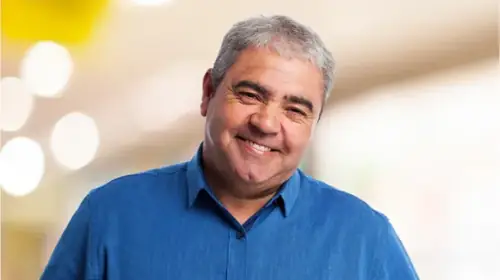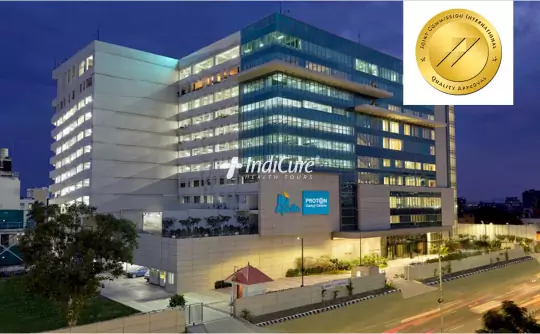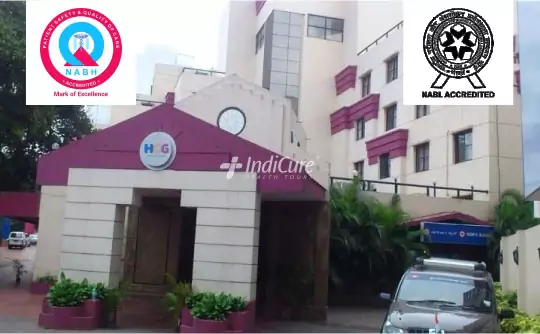

Prostate Cancer Treatment Cost in India depends on the type of treatment required, your medical condition, hospital and the city where you choose to get the treatment done.
Typical Costs for Prostate Cancer Treatment in India looks like:
| Procedure | Cost (Range in US $) |
|---|---|
| Investigations | 500-1000 |
| Chemotherapy | 500-2,000 per cycle |
| Radiotherapy | 3,500-5,500 |
| Cyberknife | 6,000-8,000 |
| Prostate Surgery | |
| - Open Radical Prostatectomy | 3,500 |
| - Laparoscopic Prostatectomy | 4,500 |
| - Robotic Radical Prostatectomy | 6,500 |
| HIFU | 4,000-6,000 |
Many times, the best option might include more than one type of treatment. Surgery, alone or with other treatments, is used to treat most prostate cancers. The cost associated with each type of treatment is different. IndiCure recommends you to understand the options by consulting our expert oncologists.
The overall prostate cancer treatment cost depends on the number of chemotherapy or radiation therapy cycles that a patient has to undergo. In some patients, the doctors might advise giving more than a couple of cycles of chemotherapy or radiation therapy to kill the cancerous cells.
An important expense when it comes to your prostate cancer treatment in India is going to be your oncologist's fees. IndiCure recommends highly experienced, skilled, board-certified surgeons who are capable of delivering successful surgeries. Although the charges may vary depending on the experience of the surgeon, you can be assured that you are in safe and skilled hands when you choose cancer treatment in India with IndiCure.
Having your treatment for prostate cancer in an accredited surgical facility by skilled and qualified medical staff is a critical factor. Moreover, the geographical location of this facility in India also affects the quote. But, IndiCure provides you with a projected estimate that will be all inclusive and affordable.
The pre-surgical/treatment expenses are associated with the stage of the cancer and medical condition of the patient and thus the number and type of investigations and treatment required. Post-treatment expenses may include prescription medications and follow-up consultations.
We at IndiCure, understand that you travel with a budget in mind and do not like to be greeted by surprises after arrival in India. We thus club all these expenses and give you the package cost that is inclusive and affordable at the same time.
Your case manager shall give you an estimated cost of your surgery after discussing your medical reports with the surgeon. The final cost, however, shall be confirmed after your consultation with the surgeon.
In fact, we have Special Negotiated Rates with the Hospitals and you can avail Discounted Rates when you choose to Travel with IndiCure.


We Help you Choose the Right Treatment, Surgeon & Hospital

We Arrange Video/Telephonic Consultation with the Surgeon

We Assist you with Visa & Accommodation

We Receive you at the Airport and Drop you at Hotel/Hospital

We Assist you the at Hospital & Provide Post Operative Support

Chennai
The Apollo Proton Cancer Centre (APCC) is South Asia's and the Middle East's first and only proton therapy centre, as well as India's first JCI-accredited cancer hospital. The APCC includes a completely integrated treatment suite that provides the most advanced surgical, radiation, and medical procedures available. The Centre brings together a remarkable team of clinicians renowned globally in cancer care, in keeping with the Apollo Pillars of Expertise and Excellence.

Bangalore
HCG- HealthCare Global Enterprises Ltd, is the specialized chain of hospitals in cancer care headquartered in Bangalore. Founded by Dr. Ajaikumar, a renowned medical and radiation oncologist with 40 years of experience, HCG has 26 centres across India with its largest facility in Bangalore.
HCG Hospital Bangalore is not only the most advanced facility for cancer care in India, it is a Centre of Excellence for most advanced cancer care and research.
Prostate is the tiny walnut shaped and sized gland present in males in between the bladder and genital organs. The main function of the prostate is to produce seminal fluids which protect and nurture the sperms and help in transporting the sperms during ejaculation.
Prostate cancer is the most common type of cancer affecting men but mortality is less as it can be treated completely with the help of multiple treatment options like surgery, radiation therapy and chemotherapy.
The prostate cancer typically advances slowly and primarily remains restrained to the prostate gland and thus requires minimal treatment. However, some prostate cancers may need quick attention and aggressive treatment for complete cure.
Early detected prostate cancer that is confined to the glad itself has good chances of complete cure. Prostate cancer may not show any signs and symptoms when it is at its early stage but more advanced cancer may cause symptoms like Blood stained semen, discomfort and pain in pelvic region, difficulty in micturition, bone pain, erectile dysfunction etc.
It is thus important at this point to seek the doctor's advice and get the lab test done which shall aid to know the stage of prostate cancer to determine the appropriate treatment accordingly. The stages of prostate cancer are:
The exact cause of prostate cancer is still unknown but there are certain risk factors that are identified to cause prostate cancer. These include:
Prostate cancer can be treated with the following options which depend on the size and site of the cancer, stage of the cancer and extent to which the disease has spread.
It comprises of high intensity energy to destroy the cancerous cells and is delivered in 2 ways;
Radiation from outside the body is focused on the prostate gland using high powered energy beams like protons or X-ray.
Radiation is delivered from inside the body. It involves placement of radioactive seeds which are rice-sized that emit a low dose of radiation for a long period. The seeds are implanted in the prostate using ultrasound guided needles.
The cancer cells of the prostate are dependent on the male hormone testosterone for their growth. Thus, hormone therapy aims at inhibiting the production of testosterone that may stop the growth of the cells or may cause them to die. This therapy includes;
agonists to stop the production of testosterone. The medicines include goserelin, leuprolide, histrelin and triptorelin.
the testosterone to reach the cancer cells. These include flutamide, bicalutamide and nilutamide.
It is used to destroy the fast growing cells by using injectable drugs. It is the treatment of choice for the men whose cancer has advanced to other areas of the body or for the men who have not responded well to the hormone therapy.
Also known as immunotherapy in which your own body's immune system is made to fight the cancer. In this way some of your immune cells are taken and genetically modified in the lab and are injected back into your body to fight the cancer cells.
The surgery to treat prostate cancer is to remove the prostate gland and is known as Radical prostatectomy. Radical prostatectomy is the surgery done to remove the entire prostate and any nearby tissues i.e seminal vesicles and some nearby lymph nodes that may contain cancer. It is the surgery of choice in men whose cancer is limited to the prostate. Following are the different approaches of the prostatectomy;
This is a minimally invasive method in which the prostate is removed through small incisions in the abdomen with the help of laparoscope.
The surgical instruments are attached to the robot (mechanical device),and the surgeon uses the controls to direct the device to move the instruments. This surgery is gaining immense popularity as it is a more precise, less traumatic and minimally invasive procedure. The most popular robotic prostatectomy includes the da Vinci surgical systems which aids to provide dexterity, precision and advanced visualization compared to open and laparoscopic surgery. Using da vinci robotic prostatectomy the surgery can be done through small incisions of 1-2 cm.
It is performed when the cancer is entwined with the nerves to maintain the normal function and structure of the nerve.
Traditional open surgery to remove the prostate gland. The prostate is removed through an incision on the lower abdomen.
Prostate is reached through an incision between the anus and scrotum.
Men younger than age 75 with limited prostate cancer who are expected to live at least 10 more years tend to get the most benefit from radical prostatectomy.
The ideal candidates for prostate cancer surgery are those whose cancer is limited only to the prostate, less than 75 years of age and are otherwise in good health.
We at IndiCure completely understand your concerns and it is always our endeavor to provide the best outcome for every patient. Following is the list of questions you must ask before you embark on your journey for prostate cancer treatment in India.
Prepare to answer questions about your:

The Laparoscopic or robotic assisted or the da Vinci robotic prostatectomy in the minimally invasive procedure that provides with the best results in regards of less pain, less scarring and better outcomes after the surgery. The only difference between the laparoscopic and robotic assisted prostatectomy is that the first one is performed at hands of the surgeon using a laparoscope whereas the other one is done by the robot which is controlled and manipulated by the controls being operated by the surgeon.
The surgery is performed under general or local anesthesia depending on the choice of surgeon.
During the surgery 5-6 small keyholes of 1 cm size are made on the mid abdomen and a telescopic lens is put inside that provides the magnified view of the structures like nerves, blood vessels, muscles adjacent to the prostate, thus optimizing the preservation of these structures.
Using the miniaturized robotic instruments which are inserted through these keyholes, the prostate gland is cut away from the bladder and removed through one of the key holes.
This surgery has an advantage of less blood loss than the traditional one. The surgery usually takes 2-4 hours to complete.
Results of radical prostatectomy are quite good if the cancer is limited to the prostate. The aim of prostate removal surgery is to cure prostate cancer. Men whose prostate cancer has not spread to other areas have an 85% chance of surviving 10 years after radical prostatectomy.
However, if cancer has spread to the other parts, further treatment like radiation therapy would be required to cure cancer. One should do the regular medical check-ups to make sure that the cancer does not come back.
The patient would need to stay at the hospital for 3-4 days after radical prostatectomy. A urinary catheter is inserted which needs to be there for a few days after the surgery. One would feel pain and discomfort which would be controlled with medications.
The patient can resume routine activities in about two weeks after the surgery. Strenuous activities, sexual activities need to wait for 8-10 weeks and may take months to return to its maximum level.
It is necessary to have a regular follow up after radical prostatectomy to make sure that cancer does not come back.
The prostate gland is part of the male reproductive system. During ejaculation, the gland produces fluid that combines with semen. This fluid protects and maintains the health of sperm in preparation for fertilization aiding in pregnancy.
The prostate gland is located in front of the rectum, beneath a man's bladder. The urethra flows through the prostate gland's core. This tube transports urine and sperm from the penis to the outside of the body. Behind the prostate gland are the seminal vesicles that produce sperm.
Prostate cancer is the second most frequent cancer in men, after skin cancer. Every year, about 200,000 men in the United States are diagnosed with prostate cancer. There are numerous effective treatments available, and some men do not require treatment at all. Every year, some 33,000 men die as a result of the condition.
Prostate cancer in its early stages rarely causes symptoms. As the condition advances, these issues may arise:
Men over the age of 55 are at a higher risk of developing the condition. As you become older, your chances of acquiring prostate cancer grow. In fact, males over the age of 65 account for 60% of prostate cancer cases. Other factors that increase the risk of prostate cancer are:
Prostate cancer strikes the majority of men as they grow older for no apparent reason. There is no way to avoid it. If you have certain prostate cancer risk factors, however, doing the following activities can help you reduce your risk and diagnose the disease early:
Adenocarcinomas are the most common type of prostate cancer (malignant tumors). This type of cancer begins in the cells that produce secretions in glands. Other cancers can occur in the prostate, but they are uncommon. These are some of them:
Nobody knows why certain cells in the prostate gland get cancerous (malignant). Genetics appears to be a factor. Consider the following scenario:
Prostate cancer screenings are the most efficient technique to detect the disease early. If your cancer risk is average, your first prostate screening will most likely be at the age of 55. If you have a family history of the disease or are Black, your healthcare professional may begin testing sooner.
Prostate cancer screening tests include:
Rectal Examination: Your doctor may use a gloved, lubricated finger to feel the prostate gland during a rectal exam. Bumps or hard spots could be signs of cancer.
PSA blood test: The prostate gland produces a protein known as protein-specific antigen (PSA). PSA levels that are too high could be a sign of malignancy, though that is not a confirmatory test. PSA levels also rise if you have BPH or prostatitis.
Biopsy: The only definite approach to identify prostate cancer is to take a needle biopsy and look for cancer cells in the tissue. Magnetic resonance imaging (MRI) technology offers detailed images of the prostate during an MRI-guided prostate biopsy.
Not all prostate growths are malignant, and not all prostate symptoms are indicative of cancer. Other medical problems that give similar indications as prostate cancer are:
BPH (benign prostatic hyperplasia): Almost every man will experience benign prostatic hyperplasia at some point in his life (BPH). This disorder causes the prostate gland to enlarge, but it does not increase the risk of cancer. The urethra is squeezed by the enlarged gland, which prevents the flow of sperm and urine. Medications and, in some cases, surgery can be beneficial.
Prostatitis, or inflammation and swelling of the prostate gland, is more common in men under 50. Bacterial infections are frequently to blame. Antibiotics and other drugs are used as treatments.
Because prostate cancer is a slow-growing cancer, most men die of causes other than the disease. The importance of early detection in achieving better results cannot be overstated. Almost all men diagnosed with localized cancer that hasn't spread outside of the prostate live for at least five years after diagnosis (about 97 percent to 98 percent). One-third of men who have metastatic cancer that has spread outside of the gland live for five years.
The bladder, erectile nerves, and the sphincter muscle that controls urine can be affected by some prostate cancer treatments. Among the issues that could arise are:
Urinary incontinence: few men face this problem after the treatment. When you cough or laugh, you may leak urine, or you may feel compelled to use the restroom even if your bladder isn't full. This usually improves within a few months even without the treatment.
Erectile dysfunction (ED): Surgery, radiation, and other therapies can harm the erectile nerves, making it difficult to get or keep an erection. Within a year or two, some men restore erectile function (sometimes sooner). Meanwhile, drugs that increase blood flow to the penis, such as sildenafil (Viagra®) or tadalafil (Cialis), can aid.
Male infertility: can be caused by treatments that impact your ability to create or ejaculate sperm. You can store sperm in a sperm bank before starting treatments if you think you might desire children in the future.
Make your medical trip to India even more comfortable and complete with our range of additional services, designed to take care of all your needs beyond the hospital.
Traveling abroad for medical reasons can be challenging if you are alone, but with IndiCure by your side, it doesn't have to be. With over fifteen years of experience and an exclusively curated network of India's best surgeons and top hospitals, we make your medical tour to India easier and safer. We will guide you at every step, handling all the end-to-end arrangements for your surgery, travel, and stay.
Ramandeep Dhaliwal
a month ago
I had great experience having rhinoplasty through Indicure. Dr. Ruchika from Indicure has helped me in finding best plastic surgeon, answering all my questions...
Ramandeep Dhaliwal's Full Review
Joshua Archer
3 months ago
My name is Joshua Archer I'm from New Zealand, bay of plenty, kawerau I opted for the bypass surgery in January 2023 but planned it in advance for 28 September found IndiCure...
Joshua Archer's Full Review
Kera Ren
8 months ago
Absolutely loved my experience with IndiCure - from first inquiring to meeting the surgeon pre op to my follow up post op. The surgeon was extremely approachable...
Kera Ren's Full Review
Andreana Paul
5 months ago
Had a wonderful experience. Visited India for my plastic surgery. From sending mails, airport pickup, comfortable accommodation and, to smooth hospital appointment booking...
Andreana Paul's Full Review
Brandi Luce
5 months ago
I had the privilege of using Indicure's services for a cosmetic procedure that I had wanted for a long time but had always been apprehensive about. Ruchika helped me...
Brandi Luce's Full Review
Jade M
3 years ago
Indicure Health Tours went above and beyond my expectations. They helped me with every aspect of my journey and were professional, kind and caring. I was...
Jade M's Full Review
The content on the website (www.indicure.com) is intended to be general information and is provided only as a service. All photographs on our website of before and after results are examples only, and do not constitute an implied or any other kind of certainty for the result of surgery.
Learn about IndiCure Health Tours' comprehensive editorial policy that strives to deliver trustworthy, helpful, relevant, accurate and people-first content on medical tourism in India.
It is not medical advice and should not be taken as medical advice. It should not be used to diagnose or treat a health condition and is in no way meant to be a substitute for professional medical care. You are advised to see a surgeon in person to assess what surgery may or may not accomplish for you.
It is also important to keep your expectations realistic and to understand that all surgical procedures carry risks and should never be taken lightly.